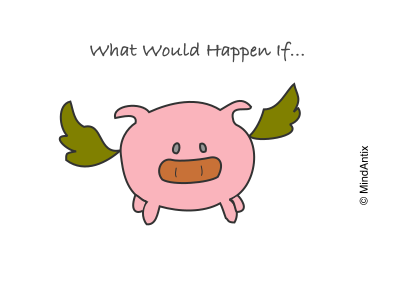In the late 80s, researchers studying logical learning in children gave a group of 4 year olds the premise that ‘all pigs can fly’ and that ‘John is a pig’. Most of the kids had trouble reaching the conclusion that ‘John can fly’, until the researchers changed the instructions a little.
When the researchers first told the kids ‘let’s pretend that [all pigs can fly]…’, their performance on this task improved significantly. Somehow, transferring the rule to a pretend world helped the children in reasoning abstractly about that world.
The exact mechanism of why pretending helps with reasoning is not fully clear, but research in the last couple of decades has shown that pretend scenarios play an important role in cognitive development.
Psychologists, Weisberg and Gopnik, have proposed that unrealistic pretend scenarios don’t just help with counterfactual reasoning – they are also important for causal learning which can in some cases be harder to do with real-world scenarios. As they explain about Einstein’s theories, “Einstein’s thought experiments are a good scientific example of how unrealistic counterfactuals can help to distinguish potential causal structures. Both relativistic and classical theories of physics make similar predictions in commonly observed cases. Considering very unlikely possibilities, such as a world where the speed of light is different, can help discriminate between these theories.”
Unrealistic pretend scenarios are also an integral part of creative thinking and utilize, among other things, associative thinking. For instance, comprehending the statement, ‘If dogs had gills…’, requires “creation of an unusual conceptual combination (‘dogs’ and ‘gills’) with potential consequences that go beyond what is literally stated.”
Torrance, also known as the father of creativity, included two tasks (‘Just Suppose’ and ‘Consequences Task’) around improbable situations in his Torrance Test of Creative Thinking.
Our newest category of brainteasers at MindAntix, ‘What Would Happen If…’, present unrealistic scenarios and ask users to come up with as many reasonable consequences as possible. Our goal is to build the cognitive processes underlying logical and creative thinking like disengaging with reality, making inferences and associative thinking.
So, the next time you are bored try making up a new world where the usual rules don’t apply. How would things be different in that world? What would happen as a consequence of those strange new rules? And maybe while thinking about that you might even discover a new insight about our own world!

